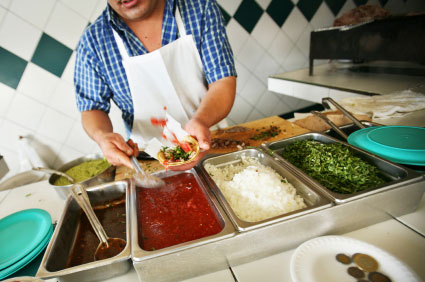CIUDAD JUÁREZ, México — Daytime here displays a busy city, alive and full of productive energy. Street vendors hawk their products, restaurants await the rush hour crowds and mechanics do tune-ups out of their homes.
These images of a normalcy, however, are deceptive. More than 5,000 of Juarez businesses have closed their doors permanently during the past four years of drug war violence, according to Cámara de Comercio de Juárez, which has infected every aspect of Juarenses’ life.

(© iStockPhoto.com/kevinruss)
Nighttime is a different creature altogether, according to Martín, the owner of a few very profitable food stands in Juárez and no stranger to the cartels. Martín requested we use an alias.
“The first time they came, they came in the day. The second time they came, it was because I had refused to pay and they robbed one of my stands. That’s when I finally paid,” Martín said.
This is a common occurrence in Juárez these days. Drug cartels are now trying more than ever to institutionalize their control over the city by charging people “taxes” and many business owners have gone through the trauma of facing a stranger in their office demanding a payoff “tax” for protection.
“There is very little conversation, but they make it obvious what they are there for,” said Martín, adding that he was a past victim of refusing to pay their quotas. “A man came in and began asking me questions about my business like what the traffic of customers was like, how much profit the stand yielded.
I honestly believed he wanted to buy the stand or something because he was dressed very classy and arrived in a European car. Then he asked if my business was protected and I still wasn’t catching on to what was going on.”
Martín said the well-dressed man danced around the topic for a while before he hit him with the offer.
“For a while he danced around it, then he hit me with it. ‘Look, there are a lot of criminals out there that will rob the stand, burn it, and the police won’t do anything about it. They may even harm you, but if you come under our protection we’ll make sure nothing happens to the stand or to you,’ Martín said.
Martín said he literally did not know what to say, he felt he knew this day was coming, friends were telling him they had been visited, but nothing prepared him for it.
“Once he knew I caught on, he said he wanted me to meet his ‘numbers guy’ so that he could calculate what the proper quota would be for this stand,” Martín said.
A formal “yes” was not needed from Martín, his compliance came by way of submission. He just allowed it to happen. Whatever these men asked for they were going to get, including the books and accounts to the stand. His papers were returned four very long days later, with a note that simply had a time, a place and an amount—a very large amount.
When the time came to pay his quota, Martín never showed and he felt the consequences immediately. Only one day after missing the appointment to pay, the stand was robbed and completely ransacked.
“The way they left it (the stand) was despicable, they broke the napkin holders, they broke the stools more times and in more ways than I thought was freaking possible, they destroyed my kitchen appliances,” said Martín, who has never missed an appointment to date since that incident.
This story is similar to others who refused to pay, but unfortunately, some have not been so lucky. Many injuries and deaths have come by way of retaliation from cartels when businesses refuse to pay their quotas.
Martín believes that everyone in Juárez is to blame for the situation here.
“We let this happen by allowing corruption to disable our government. Police, politicians, even the businesses are corrupt. The city has been completely squeezed and we are suffering the consequences,” said Martín, claiming his family, friends and other Juarenses feel the same way.
The situation is progressively getting worse, but that gives Martín some hope. He believes that the structures in place now need to break down completely before anything can get better.
“We must start from scratch. New leaders, new business, and no corruption,” Martín said.

